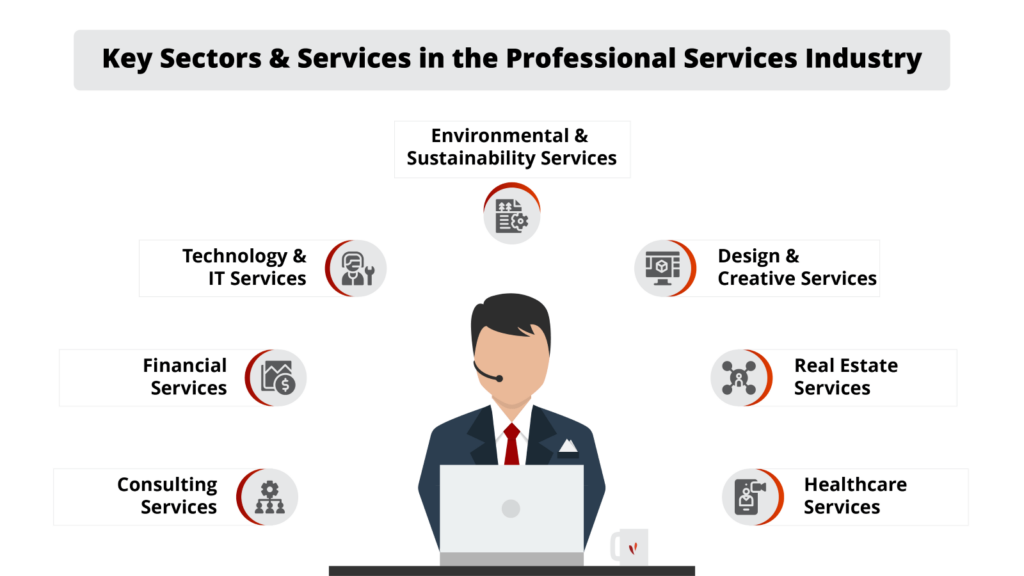Major 5 Transformative Trends in Professional Services Industry

In the words of technology visionary Bill Gates, “IT and business are becoming inextricably interwoven. I don’t think one can talk meaningfully about one without talking about the other.” These words have never rung truer than in the context of the Professional Services Industry. Over the last decade, this sector has undergone a massive transformation in work culture, management practices, skill requirements, and more, largely driven by technology. This technological wave has not only empowered businesses but also redefined the way they operate and expand.
Let’s embark on a journey to explore five major transformative trends in Professional Services Industry, underpinned by the ever-evolving market trends, customer demands, and new service delivery models.
Before diving deep into these trends, let’s establish a foundation:
Unveiling Professional Services Industry
The professional services industry is a dynamic and multifaceted sector that plays a pivotal role in supporting businesses, organizations, and individuals across a wide array of fields. This industry is characterized by the provision of specialized knowledge, expertise, and skills to address complex challenges, make informed decisions, and drive growth.
Now, let’s delve into some of the key services and sectors in the professional services industry:

Consulting Services: Consulting firms are at the forefront of this industry, providing valuable insights and strategies to help businesses optimize operations, enhance efficiency, and achieve their goals.
Financial Services: Financial professionals, including accountants and financial advisors, help clients manage their assets, plan for the future, and ensure compliance with financial regulations.
Technology and IT Services: IT consultants and technology experts assist with digital transformation, cybersecurity, and the development of cutting-edge software and systems.
Healthcare Services: Healthcare professionals and consultants work to improve the quality and efficiency of healthcare delivery, ensuring better patient outcomes.
Real Estate Services: Real estate experts facilitate property transactions, manage investments, and provide valuable insights into the real estate market.
Environmental and Sustainability Services: In an era of growing environmental consciousness, consultants in this field guide businesses in adopting sustainable practices and meeting regulatory standards.
Design and Creative Services: Creative agencies and designers contribute to branding, marketing, and the visual identity of businesses and products.
As we navigate the road ahead, five key trends are shaking up the professional services industry, transforming business models and reshaping workplace culture:
Major 5 Disruptive Trends in Professional Services Industry
Here are five major trends that are disrupting and redefining the Professional Services Industry:
-
Re-evaluate the Core Strategy: Aligning with New Norms
Professional service firms are distinguished by their bespoke services and long-lasting client relationships. To retain a competitive edge, firms must adapt to emerging norms powered by technology. The days of relying on outdated tools and isolated data are numbered. Equipping firms with advanced software that facilitates automated service delivery and provides precise client insights is essential to ensuring sustainability.
-
Business-Centric Trend
The Emergence of Automation and Artificial Intelligence
McKinsey’s research highlights a notable example: a leading bank automated approximately 900 back-end operations, liberating 50% of its full-time employees from administrative tasks. These employees were then redeployed to more meaningful activities, boosting overall productivity.
Artificial Intelligence and automation have simplified complex data analysis processes, interpreting real-time data and transforming large datasets into actionable insights. Automation technologies such as RPA and Chatbots are streamlining back-end operations, enhancing task efficiency, and allowing human resources to concentrate on role-specific tasks.
-
Globalization and the Rise of Virtual Offices
A recent study conducted by Gartner reveals that an impressive 82% of Company Leaders intend to permit employees to work remotely.
Collaboration tools and intuitive project management platforms have facilitated global cooperation. Firms are now scouting for talent on a global scale, with remote work rapidly becoming an integral part of the corporate landscape, catalyzed further by the impact of the COVID-19 pandemic.
A Value-Driven Revenue Model
Traditional billing models in professional services tend to charge clients on an hourly basis, disregarding the tangible value generated by each task. The shift towards a value-driven revenue model involves billing clients based on the benefits and profits accrued during the project. This transition aligns the interests of professional services firms more closely with those of their clients and bolsters profitability.
-
Employee-Centric Trends
Harnessing Hybrid Talent to Bridge Skill Gaps
To address inefficient hiring practices, organizations are adopting a hybrid talent model, which encompasses a combination of full-time employees, contractors, freelancers, and other resources. Advanced tools are now capable of predicting resource requirements in advance, significantly reducing project resourcing costs, optimizing allocation, and mitigating employee burnout.
-
Cultivating a Tech-Enabled Work Culture to Amplify Team Engagement
Team engagement is pivotal to business success. Forbes emphasizes that highly engaged teams demonstrate 21% greater profitability. Building a tech-enabled work environment has become essential, particularly for teams operating across different geographic locations. Advanced collaboration tools and investments in tech-centric work culture facilitate real-time communication, quick problem-solving, and heightened productivity.
The future of professional services holds the promise of innovation, efficiency, and client-centricity. Embracing these trends, as underscored by pertinent statistics and insights, will be paramount for firms aspiring to thrive in this ever-evolving industry.
By embracing the fusion of technology and business acumen, professional services firms can position themselves as agile, value-driven partners in the businesses of tomorrow.
Embracing these trends isn’t just about staying relevant; it’s about setting the stage for a more efficient, collaborative, and customer-focused future. The professional services landscape is evolving, and those who adapt will thrive in this dynamic environment.
Are you ready to embrace these disruptions and lead the way in your industry?
Navigating the Future: A Blueprint for Success in the Professional Services Industry
As we look ahead to 2025, the professional services industry is poised for significant transformation. To thrive in this ever-evolving landscape, firms must:
- Embrace Client-Centric Solutions:
Prioritize a client-centric approach, tailoring solutions to individual client needs and building lasting relationships through exceptional experiences.
- Leverage Advanced Data Analytics:
Harness the power of data analytics to make informed decisions, gain insights into market trends, and offer data-driven solutions to clients.
- Foster a Culture of Innovation:
Encourage a culture of innovation, invest in research and development, and embrace emerging technologies to stay at the forefront of industry trends.
- Prioritize Cybersecurity and Data Privacy:
Strengthen cybersecurity measures, comply with data protection regulations, and build trust by prioritizing data security.
- Develop Specialized Expertise:
Cultivate expertise in niche areas, become thought leaders, and position the firm as the go-to source for specialized services.
- Embrace Remote Collaboration:
Adapt to remote work by enabling secure collaboration, investing in communication tools, and offering seamless virtual client interactions.
- Promote Sustainability Practices:
Incorporate sustainability into service offerings, help clients achieve their sustainability goals, and lead by example in environmental responsibility.
- Enhance Talent Development:
Attract top talent with competitive compensation and benefits, provide professional development opportunities, and foster a diverse and inclusive workplace for innovation.
- Build Strategic Partnerships:
Form strategic alliances with complementary firms, collaborate to expand service offerings, and pool resources for mutual growth and success.
- Adapt to Regulatory Changes:
Stay updated on industry regulations, ensure compliance, and offer expert guidance to clients on regulatory matters.
Incorporating these strategies in a holistic manner sets the stage for a successful and sustainable future. By embracing change, businesses can navigate the dynamic landscape and emerge as leaders in their respective industries.
In Conclusion
As the curtain rises on the future, the professional services industry will be redefined by its ability to adapt and innovate. With more efficient project delivery, enhanced client engagement, and data-driven insights, the industry will soar to new heights.
The stage is set, the spotlight is yours – will you seize the opportunity and lead the way?
For inquiries and guidance, KaarTech stands as your steadfast ally. Connect with us, and let’s embark on this transformative journey together. To explore further, visit our website and discover how we can shape success hand in hand.
FAQ’s
What are Professional Services Industry?
The professional services industry is a dynamic and multifaceted sector that plays a pivotal role in supporting businesses, organizations, and individuals across a wide array of fields. This industry is characterized by the provision of specialized knowledge, expertise, and skills to address complex challenges, make informed decisions, and drive growth.
What are the key services within the professional services industry include?
Some of the key services and sectors within the professional services industry include Consulting Services, Financial Services, Technology and IT Services, Healthcare Services, Real Estate Services, Environmental and Sustainability Services, Design and Creative Services.
How are professional service industries adapting to the changing market dynamics?
Professional service industries are embracing emerging trends and technologies to stay competitive. They are focusing on delivering customized services to each client and nurturing lasting relationships. Integration of technology, agility, value-driven approaches, and technological enablement are being prioritized to optimize service delivery and future-proof their operations.
What are the major disruptive Trends in Professional Services Industry?
The major disruptive trends in Professional Services Industry includes Re-evaluate the Core Strategy, Business-Centric Trends, Globalization and the Rise of Virtual Offices, Employee-Centric Trends, Cultivating a Tech-Enabled Work Culture to Amplify Team Engagement

